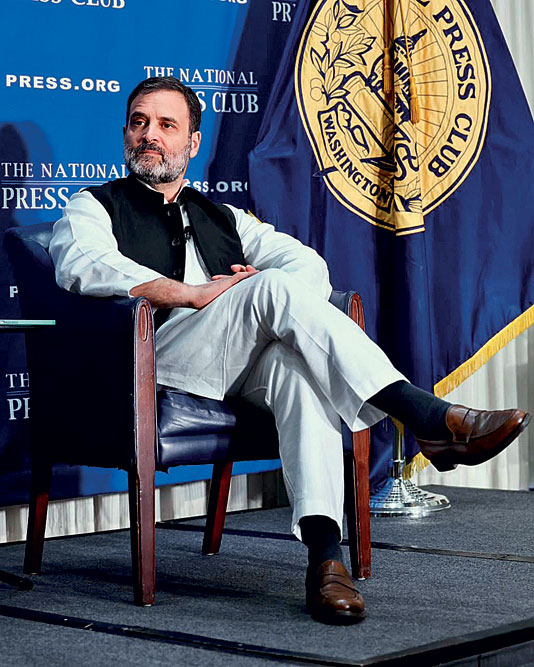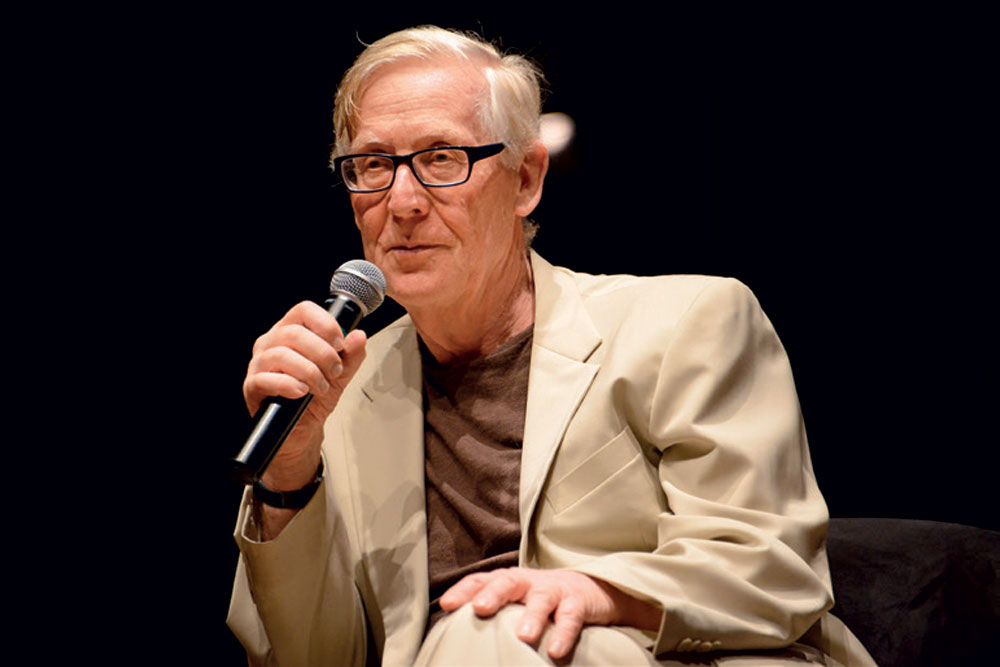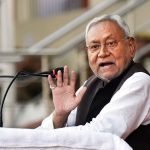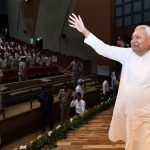Who Denies India its Nationalism?
The arc of the nation
 Swapan Dasgupta
Swapan Dasgupta
 Swapan Dasgupta
Swapan Dasgupta
 |
11 Aug, 2023
|
11 Aug, 2023
/wp-content/uploads/2023/08/Thearchofthenation1.jpg)
Prime Minister Narendra Modi (Photo: Getty Images)
IN THE EARLY-1970s, when intellectualism was co-terminus with a selection from the shade card of Marxism, I recall reading a passionate article in the Socialist Register by the historian EP Thompson. The wider aspects of ‘An Open Letter to Leszek Kolakowski’ are by now either dated or, at best, only relevant to the chroniclers of the lost way. There is, however, a side stream that has retained some relevance.
Recounting the criticism levelled against the ‘old New Left’ by the post-1968 New Left, Thompson wrote: “We were, it turned out, insufficiently ‘rigorous’: which was true. We were confined within a narrow nationalist culture and unaware of the truly internationalist Marxist discourse: which meant, in fact, that we had…attended insufficiently to a particular dialogue between Parisian Marxists and Parisian existentialists. And we were not intellectually ‘reputable’: which meant that our work was not well-regarded in Oxford.”
A substantial part of Thompson’s ire was directed at Perry Anderson, a Marxist scholar whose expansive erudition (not to mention his disconcerting habit of peppering his English writings with phrases from nearly every conceivable West European language) was intellectually intimidating. Anderson and his compatriot Tom Nairn had accused the likes of Thompson of being beguiled by the English ideology that incorporated English empiricism, English provincialism and, among other things, English nationalism.
The spat in the New Left Review took place in the early- 1960s, and its impact on the politics of Great Britain or, even the British Left, was less than negligible. In 2012, quite unexpectedly, and for no apparent political reason, Anderson burst on the Indian scene with his sharply polemical The Indian Ideology. It was an attack on the nationalist consensus, whose firm grip on the Indian imagination—which included the Left—was, presumably, a deterrent to the rise of any genuine radical alternative. There has, he suggested, “a passive accommodation to the myths of the Indian ideology, and the crimes of the state committed in their name. The hegemony of edulcorated versions of the national past is perhaps the most striking aspect of an internalization of the ruling ideas of the time.” (The Indian Ideology)
A strong whiff of his attack on the English ideology of the old Left in Britain is unmistakable.
According to Anderson’s reading of the Indian past, neither Mahatma Gandhi nor Jawaharlal Nehru ever challenged the centrality of Hindu religious traditions and particularly caste in public life. Together, they were “responsible for the fantasies of a sempiternal India, stretching back millennia across every yard of land claimed by the Raj…” With his radical-tinted glasses, Anderson had little time for the constitutionalist and liberal pretensions of the post-1947 order. Indian secularism, in his view, “is Hindu confessionalism by another name.” Even the claims of democracy were sharply discounted: “The ‘shadow nation’ is not where democracy is denied, but where it is practised. What is hidden within India is Hindustan. It is that which tacitly shapes the state and determines the frontiers between freedom and repression, what is allowed and what is forbidden.”
The Indian Ideology should have triggered a discussion on Indian nationhood and the state, not least because Anderson’s reputation as a Marxist intellectual is formidable. Yet, the publication of the book, including a low-price Indian edition, was greeted in sullen silence.
There were two prescriptive features of Anderson’s dissection of the Indian ideology that were regarded as particularly awkward. The first was Anderson’s belief that “The ‘idea of India’ was essentially a European, not a local invention, as the name itself makes clear.” By ‘idea of India’ he meant faith in the unity of India, either as a nation-state or a civilisational construct. The ‘idea’ may have originated with the colonising Europeans, “But once it took hold as a bureaucratic norm, subjects could turn it against rulers and the nimbus of empire dissolve into the charisma of nation.”
It would have been interesting had Anderson been provided a copy of the lectures on the ‘idea of Bharatvarsha’ that Radha Kumud Mookerji published in 1914. If nothing, it would have served as a corrective to his underlying perception that India was a contrived European construct lacking the legitimacy of everything but force. But perhaps not. In his book, Anderson had mocked the Nehru government’s use of the Mahabharata in its negotiations with China to argue its case for India’s traditional borders along the Himalayas.
Secondly, what Anderson found galling was that the great icons of the Indian national movement, from Gandhi to Nehru, including the likes of VD Savarkar and Sardar Vallabhbhai Patel, implicitly equated Hinduism and Indian nationalism. To him, there were only two exceptions: BR Ambedkar and EV Ramasamy ‘Periyar’. In particular, he found Ambedkar to be intellectually a cut above both Gandhi and Nehru. “The condition of Ambedkar’s obduracy was that he had broken with Hinduism. The condition of Nehru’s obduracy was that he had not.” Sympathetic to the pre-Independence Muslim demand for self-determination, Anderson was struck by the deceit and obfuscation surrounding debates and discussions on the ‘Muslim question’ in India: “If Partition was inevitable, the culture whose dynamics made confessional conflict politically insuperable becomes (an)… occasion for collective shame. The party still rules [Congress was in power as the head of UPA], and the state continues to call itself secular. The fork affords comfort to neither. It is no surprise the question it poses should be so widely repressed in India.”

Anderson isn’t the first scholar of consequence to make the claim that India’s claims to secular nationhood are a myth that the Indian Establishment since 1947 (or even before) conspired to perpetuate. At a time when the Khalistan movement is tentatively resurfacing in Canada and the UK, there is a temptation to see it as the new avatar of a wider process of regional, linguistic, and religious identities asserting themselves over the Indian Nation. Certainly, if the tweets of some of the Muslim intellectual dissidents are anything to go by, the largest religious minority in India and its intellectual faces have moved away from identifying with a nation whose prime minister swears by Hindu nationalism. At present the emphasis—as in 2014 and 2019—is on Muslims voting as a bloc to defeat the Bharatiya Janata Party in the 2024 General Election. However, in the event Narendra Modi prevails for the third consecutive election, will the social contract binding the Muslim minority to the Indian state be irredeemably snapped, at least emotionally?
Many Indians have been perplexed by Rahul Gandhi’s comments abroad that India is just a ‘Union of states’ and not really a nation , or that India is a ‘negotiation’
Anderson’s slim book has been given a large measure of importance in this essay because, unlike many writers with deep connections with India, he has no known Indian baggage. This intellectual detachment may have given him the necessary space to be uninhibited with his assessments and prescriptions. To better understand the contemporary literature on Indian politics, particularly, but not exclusively, that which emanates from the campuses of Europe and North America, The Indian Ideology is obligatory reading.
The first idea that resonates is the debunking of the very idea of nationalism. This disdain with the nation was initially a preoccupation among British intellectuals, as George Orwell detected in his perceptive essays in the 1940s. But with time and the growing popularity of post-nationalist fads among Eurocrats in Brussels and the fashionistas elsewhere, nationalism has come to be equated as a war crime. The charge that Anderson and Nairn made against the old New Left in the early-1960s has grown into more than a mild charge of apostasy. Today, nationalism, of course not ‘well regarded’, is put in the category of a rogue ideology. For New Europeans trying to reshape the world after the horrible wars in the first half of the 20th century, nationalism was the perverse mindset that made monsters of the otherwise decent Germans, Italians, and others. It is also credited with perpetuating the systematic extermination of some six million Jews. Consequently, the yardstick of 21st-century Enlightenment has become the obliteration of national boundaries. The UK failed the test by opting for Brexit, Hungary failed the test by persisting with its claims of Christian nationhood, Poland proved a disappointment by refusing to take in migrants from non-European cultures, and the US let civilisation down by electing President Donald Trump until the full weight of the liberal state restored sanity.
Countries that had been scarred by colonialism presented a different intellectual challenge. There, nationalism was invariably presented as an assertion of the collective will of oppressed peoples. It was nationalism that put an end to the British Empire in India and set in motion the entire process of decolonisation in Asia and Africa. Nationalism, although it may have had the occasional rough edges, was, it was generally conceded, a force for the good. So what has changed in the past two decades to transform nationalism into an undesirable commodity?
The lure of globalisation, powerful as it is, doesn’t fully explain the waning charms of Nehru, Kwame Nkrumah, Jomo Kenyatta, and Bung Sukarno to the present generation. The decolonisation process in the 1960s and 1970s didn’t quite lead to a new awakening and new standards of good governance. But these were often attributed to the distortions generated by the Cold War and, more damagingly, the inability of the newly independent countries to manage their own mental decolonisation. Today, in the intellectual depositories of the world, globalisation is a contested idea no doubt, but it hasn’t exactly been replaced by alternative poles of attraction. While debunking nationalism is appealing, especially when nationalist regimes proffer claims to global significance—the case of India—or hold on steadfastly to their founding myths—the case of Israel—there is still no alternative worldview that is in place. What exists are multiple aesthetic rejections.
Some of these come across quite lucidly in the voluminous Shadows at Noon: The South Asian Twentieth Century by Joya Chatterji published last month with a clutch of glowing testimonials from Indian and Western academics.

With some exceptions, the use of ‘South Asian’ to explain the history of India, Pakistan and Bangladesh is often a giveaway. It presupposes that the Partition of 1947 arose from a series of unhappy accidents and miscalculations. It derailed the formation of a confederal state in the subcontinent which could have been the only legitimate successor to a centralised British-Indian Empire. This, going by Ayesha Jalal’s study, is what Muhammad Ali Jinnah always wanted and was thwarted by Nehru and Patel. If the confederal idea had been accepted, the genocide in Bangladesh in 1971 wouldn’t have happened because Pakistan’s Muslim nationalism would never have taken off in the face of Punjabi, Sindhi, Balochi and Pathan identities.
Perry Anderson had little time for the constitutionalist and liberal pretensions of post-1947. Indian secularism ‘is Hindu confessionalism by another name’
In Chatterji’s view, the quest for an Indian identity is non-kosher. The national identity should have been obliterated by a series of dominating identities based on either language or caste or even something else. Thus, she pokes fun at the Nehruvian nation-building process—including the annual Republic Day parade which was “bizarre” and “which made very little sense even if you were a child”— and posits her primary identity as a Bengali but leaving its relationship with Bangladesh somewhat fuzzy. However, she presents Bangladesh as South Asia’s big “success story”: “In a nation born in crisis—cyclone, civil war, famine—the NGOs with their quiet, dogged, on-the-ground engagement with the issues that in their view effected the Bangladeshi ‘people’ (endemic poverty and debt, above all) created a sense of a coherent narrative of what the ‘nation’ and ‘nation-building’ are about.”
In recent times, many Indians have confessed to being perplexed by Rahul Gandhi’s comments—during his overseas travels—that India is just a ‘Union of states’ and not really a nation, or that India is an “idea” or a “negotiation”. It is important to understand where these ideas originate and find political expression.
Joya Chatterji isn’t being dishonest in refusing to see a sharp rupture between the advent of Congress India in 1947 and Modi’s India in 2014. “The Hindu idea of India has been with us for a century at the time of writing, and is an intrinsic part, warts and all, of the nation’s fabric.” The challenge to the nation has come from those who celebrate the idea of fragments and for those who find an imposing India on the global stage a source of great discomfiture.
The challenge to India’s nationalism is the attempt by a declining West to maintain its economic relevance and ideological hegemony.
About The Author
MOst Popular
3

/wp-content/uploads/2025/07/Cover_Crashcause.jpg)












More Columns
Bihar: On the Road to Progress Open Avenues
The Bihar Model: Balancing Governance, Growth and Inclusion Open Avenues
Caution: Contents May Be Delicious V Shoba